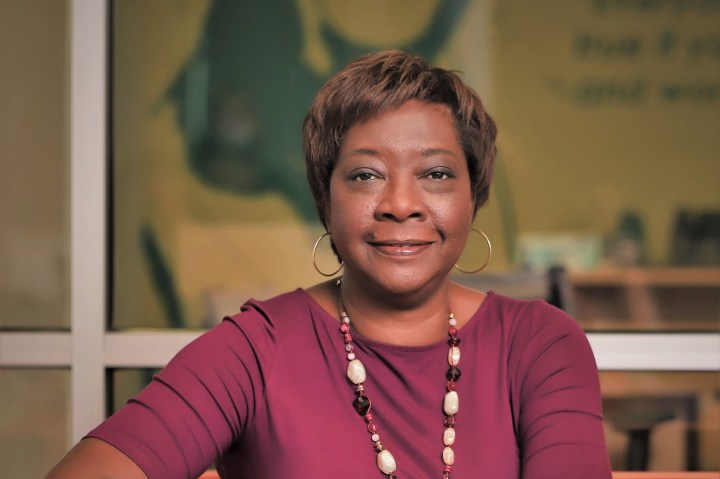
How Nebraska’s largest Black-owned business is approaching the post-pandemic era
How Nebraska’s largest Black-owned business is approaching the post-pandemic era

As the pandemic swept the country last March, Carmen Tapio knew things would change for North End Teleservices, the outsourced customer service company she founded nearly five years prior. As her company experienced a surge in demand due to the transition to remote work, school and shopping, “change” turned out to be a big understatement.
“The pandemic definitely drove the demand for telecom services, telecommunications — telemedicine, even,” said Tapio, chief executive of the company, in an interview with “Marketplace Morning Report” host David Brancaccio.
“We are at an inflection point. Our industry did see growth in the midst of the pandemic, and so we saw tremendous opportunity to put more people to work and we are looking at continuing to grow in 2021 and beyond,” Tapio said.
She spoke with Brancaccio about how the company supports its employees and how she’s approaching the coming year. The following is an edited transcript of their conversation.
David Brancaccio: I understand you’re the largest Black-owned business in Nebraska. Give me a sense of how that came to be.
Carmen Tapio: That’s right. We started North End Teleservices almost six years ago. And it came to be out of a need for job creation in Northeast Omaha, [an area] that still sees double-digit unemployment. And we have some challenges in our community, and one of those challenges is transportation. So we’ve looked for ways to help people overcome the barriers to employment, and we located our business in the heart of the community.
Brancaccio: Your firm does have a reputation of working to support its employees. Some of it is with, for instance, transportation?
Tapio: That’s right. We started a transportation program the October prior to the pandemic, and we had just completed our pilot in about March of last year. And of course, we had to shut it down. But we learned a lot through that pilot, and we have every intention of beginning it again. We really look at our people from a very personal, relationship standpoint. We believe that if we understand their stories, and we are able to really answer the needs that they have — not only in employment and career development and leadership development, but some of the personal needs, as well — that they are more engaged, they perform better, and it builds their confidence, it builds their skill level and their desire to continue to grow. So we take a very holistic approach. We have an on-site social worker that is available to anyone, full-time, for employees. We provide tuition assistance. And in an industry that is often commoditized, for lack of a better word, we really look to provide full-time, benefited employment to our employees.
Brancaccio: How did you pull it off during pandemic? Could people still do the calls remotely, or what did you do?
Tapio: Absolutely. Our technology really enabled a rapid response to the move to work from home, so within a matter of less than 10 days, we had all of our employees settled. And our ability to do that really benefited us and the entities that needed our support. So the state of Nebraska, for example, called upon us to help respond to the pandemic. And we were able to do that quite easily.
Brancaccio: During the pandemic I remember longer wait times when I tried to reach other customer service, not yours. There seems to be a lot of demand. With people from home, demand went up?
Tapio: Absolutely. You know, we weren’t going to the grocery stores; we were trying to order online; we were trying to order through phone or other means. And so, absolutely, the pandemic definitely drove the demand for telecom services, telecommunications, telemedicine, even. I think that some of the demand and the way that we interact virtually will continue. And, of course, there’s a strong desire to get back to in-person services and commerce, as well.
Brancaccio: The feds had this Paycheck Protection Program to help businesses. I think you were eligible. Did you try?
Tapio: We sure did. Of course, as many other businesses experienced, I talked to a number of banks about processing my application and ran into some challenges, May of last year, in getting that accomplished. Eventually, I was able to. I found the right partner, the right community bank to process the loans, but it didn’t go as — in my opinion — it should have.
Brancaccio: So here we are, entering the summer of 2021. I mean, are you at an inflection point, now, when it comes to your business? And how it’s greeting economic recovery?
Tapio: We are at an inflection point. Our industry did see growth in the midst of the pandemic, and so we saw tremendous opportunity to put more people to work and we are looking at continuing to grow in 2021 and beyond.
There’s a lot happening in the world. Through it all, Marketplace is here for you.
You rely on Marketplace to break down the world’s events and tell you how it affects you in a fact-based, approachable way. We rely on your financial support to keep making that possible.
Your donation today powers the independent journalism that you rely on. For just $5/month, you can help sustain Marketplace so we can keep reporting on the things that matter to you.


















